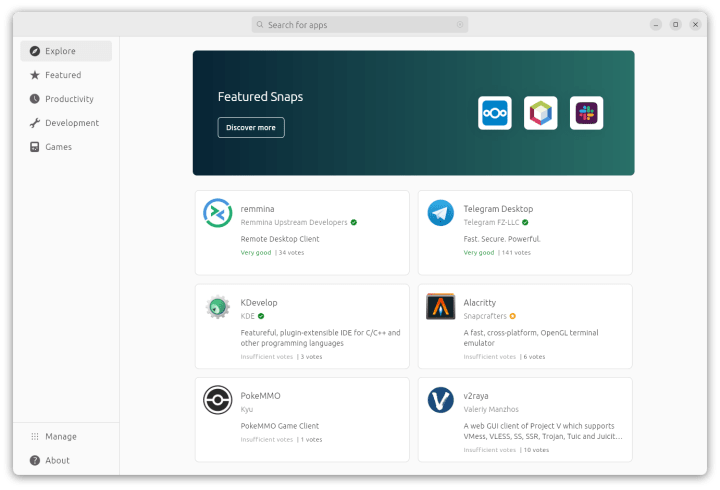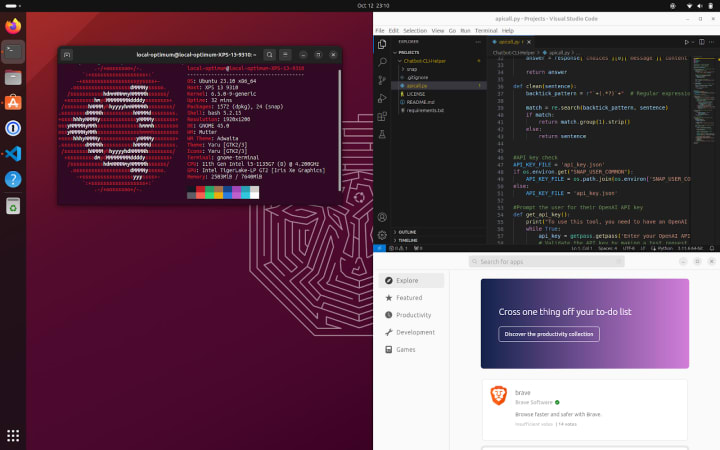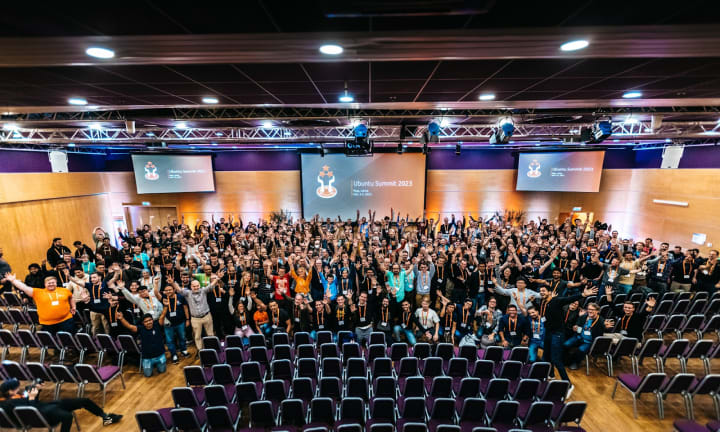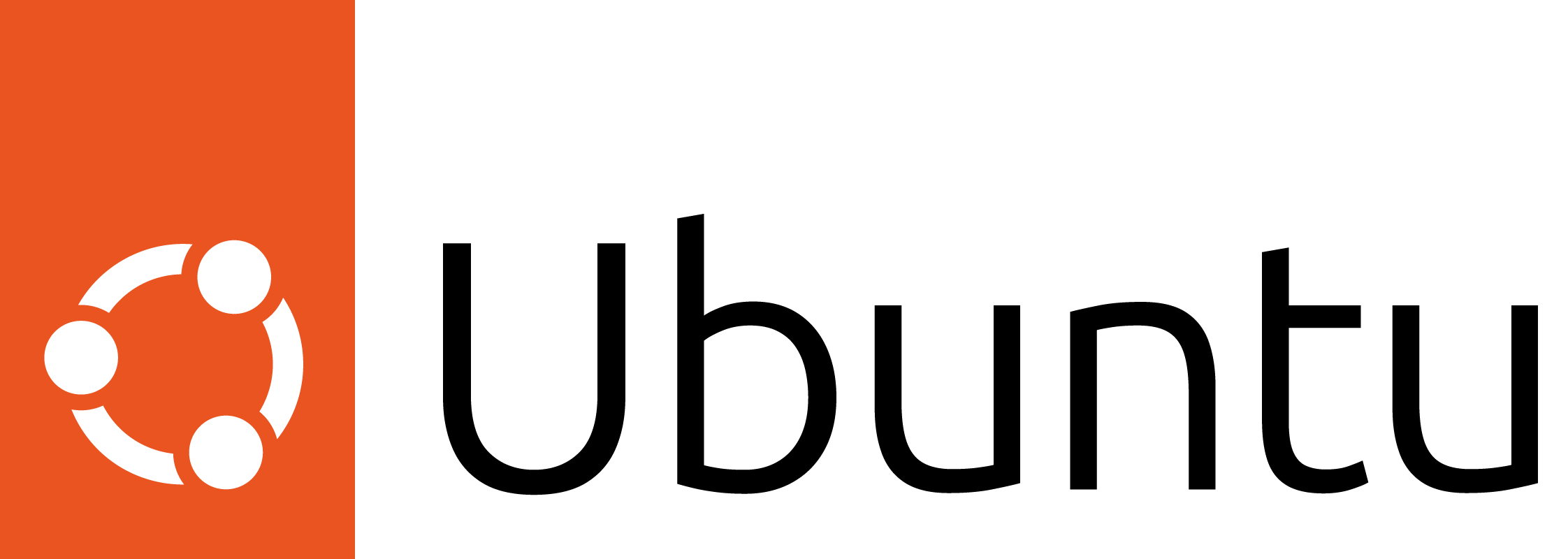End of year review: Ubuntu Desktop in 2023
Oliver Smith
on 11 December 2023
Tags: Raspberry Pi , Ubuntu Core Desktop , Ubuntu Desktop

As 2023 draws to a close, it’s time to look back on the evolution of Ubuntu Desktop over the last twelve months.
The philosopher Gary Barlow once wrote “we’ve come so far, and we’ve reached so high, and we’ve looked each day and night in the eye”. These words certainly resonate in the context of our most recent Ubuntu releases. Both the team and the community have consistently elevated and expanded upon our core values to deliver ambitious goals and set a high quality bar for what users should expect from their favourite desktop operating system.
If you’re driving Ubuntu 23.10 today, we hope that many of these improvements are clearly visible in how you work, game and develop on the platform of your choice. But if you’ve been remaining strong and stable on Ubuntu 22.04 LTS then this blog will provide a one-stop roundup of all the work that will soon be culminating in Ubuntu Desktop 24.04 LTS only a few short months from now.
So, let’s recap.
Fluttering the first time user experience

This year was really the year of Flutter on the desktop. We’ve been investing in the Flutter Linux experience for a while now and many key applications that we consider critical to the Ubuntu Desktop experience have been transformed as a result of these efforts.
First, the desktop installer was given a new, modern design and a cleaner default flow without compromising on custom configurations. This new front end also enabled us to adapt quickly to new features in the underlying installer stack, surfacing clearer user feedback around Windows Bitlocker status for dual boot configurations as well as our new encryption options which now include experimental support for TPM-backed full disc encryption.
There are even more provisioning changes planned for Ubuntu 24.04 LTS to improve configuration and identity management for those using Ubuntu Desktop at scale.
One of the other benefits of Flutter is that its popularity amongst web and mobile developers means that it’s now easier than ever for a wider group of contributors to get involved in enhancing the Ubuntu Desktop experience. Whether that’s bringing their cross platform apps to Linux or leveraging their dart skills to improve our core system applications. The new App Center (pictured above) began as a community project before landing as an official replacement for Ubuntu Software in Ubuntu 23.10, alongside our standalone Firmware Updater app.
Performance and papercuts

Snap startup performance was improved significantly with a range of fixes rolled out in both snapd and to key desktop applications. Snap updates also received improvements to messaging around refreshes and the ability for users to pause or prevent updates as needed.
The much-requested quarter-screen tiling feature also landed, leveraging Leleat’s Tiling-Assistant GNOME extension.
With 500,000 downloads since launch, the Steam snap continues growing in popularity as the preferred way to play games on Ubuntu thanks to its bundled Mesa libraries that ensure users stay on the bleeding edge regardless of their Ubuntu release. The snap has also been further upgraded with GameMode and MangoHUD bundled by default as well as improved controller and external library support.
Ubuntu Desktop on Arm devices
This year we continued to evolve our investment Arm desktop support, most visibly on the brand new Raspberry Pi 5 which was supported out of the box with Ubuntu 23.10.
We also released an Ubuntu 23.10 image for Lenovo’s X13s Gen 1. The X13s was introduced in early 2022 and featured a powerful Qualcomm Snapdragon 8cx Gen 3 SoC. This release marks an exciting milestone in the convergence of Ubuntu Desktop and Arm, offering an efficient and versatile Arm-native computing experience for users. This is just the start of an ongoing collaboration between Lenovo, Qualcomm, Arm and Canonical and we spoke about this recently at the Ubuntu Summit.
The importance of Ubuntu Desktop in education
This year also saw a renewed focus on Ubuntu Desktop in education. With more scrutiny around student privacy, as well as budget considerations for hardware refreshes and software licensing, we’ve noted a marked increase in academic and educational institutions turning to Ubuntu.
Ubuntu isn’t just a pragmatic choice for educators and administrators, it’s an exciting and accessible way for students to learn fundamental tech skills and reap the benefits of open source software. Whether in the classroom for day to day learning, or in computer labs for IT and development, Ubuntu provides a great foundation for students to learn skills that will carry through to university and beyond. And because the Ubuntu you learn on is the same one used by developers in automotive industries, VFX houses and AI research labs, investing in Ubuntu pays off in the long term, whatever you want to achieve.

This year we spotlighted two initiatives targeted at younger students. The first was from Compudopt, a non-profit organisation dedicated to providing technology access and education to under-resourced youth and their communities. The second by community engineer Aaron Prisk who introduced Ubuntu to two school districts in the United States in his previous roles as an IT Director and Systems Administrator. You can hear more about his experiences in the video above.
We also heard from the folks at New Mexico State University’s Physical Science Laboratory where they train students to be proficient researchers and system administrators ready for careers in the US defence sector. Here they needed to balance the requirement for a high degree of security compliance with the need for a Linux distribution that had a rich, community-driven ecosystem of educational and troubleshooting guides and tutorials. For them, Ubuntu was the ideal choice.
The importance of Ubuntu Desktop in the enterprise
The value we provide to enterprise users of Ubuntu Desktop completes the positive feedback loop that starts with Ubuntu being a great distribution for beginners. No matter how rich the desktop experience is, if Ubuntu Desktop doesn’t deliver a secure, integrated and manageable solution for administrators in organisations and institutions then they cannot provide their developers with the tools they need to be productive. And with Ubuntu Server being the most popular OS on both public and private clouds, ensuring that developers can work on the same OS that they deploy to in production is a critical concern.
To that end we continued to expand the scope of our Active Directory Group Policy client to support enterprise proxies, app confinement, network shares and certificate auto-enrollment. These features address key requirements for administrators supporting mixed Ubuntu and Windows devices in their organisation.
We’ve also invested in improving cloud identity support with an initial implementation of Azure AD user authentication in Ubuntu 23.04 that augments Microsoft’s new Intune agent for Linux which enables custom policy enforcement. Additional cloud identity support is planned for Ubuntu 24.04 LTS and we look forward to talking more about that soon.
To support remote or hybrid work environments, Ubuntu on Amazon Workspaces provides secure access to remote desktops and now includes new graphics bundles for GPU intensive workloads.
Collaboration with the Ubuntu community

The hand of the Ubuntu community can be seen in everything we’ve delivered this year, from direct contributions to features, guides and troubleshooting advice. We appreciate everyone who provided feedback on new initiatives, or held us accountable to the high quality bar that we set for ourselves.
This year saw two new additions to our family of official Ubuntu flavours. Edubuntu reflects our broader commitment to education and Ubuntu Cinnamon further expands the range of available desktop environments, hot on the heels of Ubuntu Unity’s addition last year.
We want to continue to inspire the community to help us deliver the best desktop experience for gamers, developers, administrators and daily users. And spending time with folks from all of those groups at the Ubuntu Summit was invaluable in ensuring that our values and roadmap reflect their needs.
New year, new-buntu
2024 promises to be an epic year for Ubuntu Desktop. Ubuntu 24.04 LTS Noble Numbat will be our tenth long term supported release, followed closely by Ubuntu 24.10 which marks the 20th anniversary of Ubuntu!
There’ll also be a new addition to the Ubuntu family in the form of Ubuntu Core Desktop, our immutable desktop solution. Ubuntu Core Desktop builds on ten years of investment in Ubuntu Core in the IoT space to provide a highly secure, composable OS for thin-client and productivity use-cases, as well as a cloud-native development experience.
Enthusiastic users have already been hands-on with Ubuntu Core Desktop at the Ubuntu Summit, but we plan to deliver a development preview build for everybody to try in the next year.
We look forward to celebrating these milestones with the community, reminiscing about the past 20 years and looking ahead to what the future of Ubuntu has in store.
After all, as Gary Barlow said, “we’re still so young, and we hope for more”. 😉
See you in the new year!

Ubuntu for desktops
The open source Ubuntu desktop operating system powers millions of PCs and laptops around the world.
Ubuntu is fast, modern, secure and it comes with everything you need to run your organisation, school, home or enterprise.
Newsletter signup
Related posts
Canonical releases Ubuntu 23.10 Mantic Minotaur
Fortified security, enhanced desktop app discovery and new hardware support lead the latest release of Ubuntu 23.10 Mantic Minotaur.
New 50 TOPS DC-ROMA RISC-V AI PC ships with Ubuntu Desktop 24.04 LTS pre-installed
Canonical is excited to announce the launch of DeepComputing’s new 50 TOPS DC-ROMA RISC-V AI PC and AI PC Mini with Ubuntu Desktop 24.04 LTS pre-installed....
Canonical announces first Ubuntu Desktop image for Qualcomm Dragonwing™ Platform with Ubuntu 24.04
This public beta enables the full Ubuntu Desktop experience on the Qualcomm Dragonwing™ QCS6490 and QCS5430 processors and complements existing Ubuntu Server...
